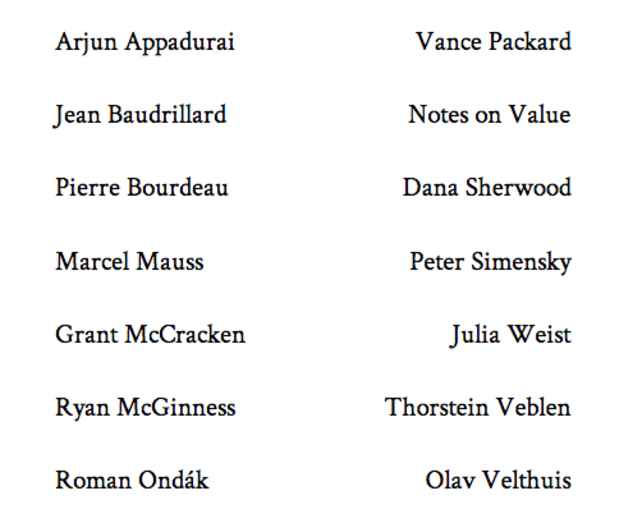“Within A Tournament of Value” Exhibition
Flux Factory

This event has ended.
Visitors to the space will engage with artworks and texts engaging with ideas of commodification and planned obsolescence, as well as the curator who will hold office hours in the space each of the 15 days.
An exhibition is to be set up as a salon from April 1st until April 15th (April Fool’s Day to Tax Day). This showcase will involve several sculptural works that move beyond the normative constraints of commodification and engage in a broader critique of systems of exchange. Additionally, a selection of texts theorizing these ideas will be available. Visitors to the space will engage with these artworks, these texts, as well as the curator who will hold office hours in the space each of the 15 days, presenting information both historical and registrarial. The gallery will remain otherwise devoid of text and the exhibition will produce no catalog.
To begin, some anthropological and economic considerations about the items and terms that surround us and this project. An item that passes through any exchange system can be broadly defined as a commodity. All objects are therefore commodified at some point. The shape of these transactions vary depending on the item in question and the narrative it tells. This period of commodification occurs within a tournament of value.
Perhaps then we might consider art objects as offering an opportunity to explore the nature of the commodity through their ability to critique social forms. We may also consider the critical writings of anthropologists, economists, philosophers, and sociologists as yielding essential views on the same set of social concerns.
By looking specifically at the notion of a caveat emptor clause, which reads ‘buyer beware,’ we can distill a more singular set of perspectives. The caveat emptor clause defines the limitations or faults of a thing in exchange. It should be noted that all objects have similar considerations and specific caveats. That said, at times certain commodities employ a scheduled obsolescence thereby internalizing this notion of a buyers’ warning. This tactic has been seen as a function of conspicuous consumption.
Art objects, with all the perspective discussed above, can engage with this idea so as to manifest a critique of consumption and of capitalism more broadly. The art objects selected all willfully employ obsolescence to varying degrees. Let us review briefly. A small print of a coupon on a dollar bill from Ryan McGinness will present an opportunity to address the cultural mainstay of currency as the root of most commodity exchanges. Roman Ondák’s Breath on Both Sides will cut through the architecture of the space and presents an air of the artist’s personage. Peter Simensky will take a measure of gold and disperse it in the form of dust. Dana Sherwood will present two projects: the first will be a collection of living butterflies; the second will be a reminiscence of a previous project in the shape of a slowly decomposing but opulent cake. Julia Weist will present an object made of glass and ice to be cracked and to melt away. Necessarily, all important gestures for such a discussion.
The scholarship available equally engages with commodification, consumption, and critique. These thinkers, from a variety of academic backgrounds, analyze the vast and varied nature of exchange systems. Jean Baudrillard and Pierre Bourdieu afford us both semiotic and sociological perspectives. Arjun Appadurai, Marcel Mauss, and Grant McCracken approach the issue from a more anthropological perspective, examining a wide variety of exchange systems in their respective writings. Finally, Vance Packard, Thorstein Veblen, and Olav Velthuis present to us the economists’ angle, focusing on conspicuous consumption and the art market respectively.
Media
Schedule
from April 01, 2014 to April 15, 2014
4-7pm daily
Opening Reception on 2014-04-03 from 18:00 to 21:00